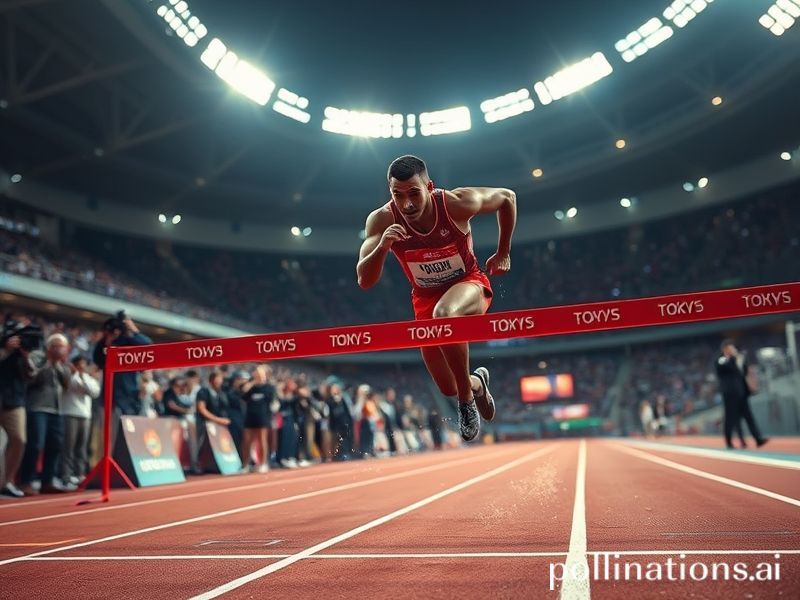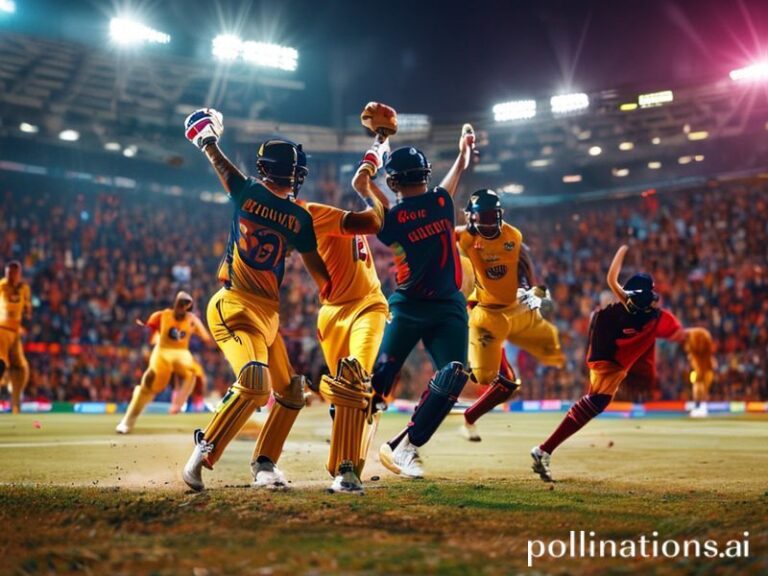Running on Empty: World Athletics 2025 Turns Tokyo into a Global Mirror of Absurdity
Tokyo, 2025 – The World Athletics Championships have returned, this time to a city that already hosted an Olympics nobody was allowed to attend. The symbolism is hard to miss: 2,000 elite athletes will once again perform for an audience of empty seats, cardboard cut-outs, and the world’s most expensive television contracts. Welcome to the quadrennial festival of human speed, endurance, and the exquisite art of pretending everything is perfectly fine.
In the shadow of a half-finished Olympic Village—now a deluxe Airbnb ghost town—organizers have promised “a carbon-negative event.” Translation: they bought more offsets than a crypto bro on Earth Day and installed enough solar panels to power a moderately ambitious toaster. Still, the gesture plays well in Brussels, where EU regulators have begun measuring athletic glory in grams of CO₂ per medal. Somewhere, a Belgian bureaucrat is drafting annex 14-B: “Maximum allowable perspiration per 100 m sprint.” Athletes, meanwhile, have been advised to sweat “strategically.”
The geopolitical backdrop is the usual carnival of détente and quiet sabotage. The Russian Athletics Federation remains in exile, its athletes competing under the flag of Individual Neutral Athletes—three words that sound like a failed indie band. Their singlets are so aggressively bland they could be worn to a UN sanctions hearing. China, never missing a branding opportunity, has sent a squad wearing uniforms that subtly spell out nine-dash lines if you squint from the upper deck. When asked about it, an official replied, “Cartography is a performance sport.” The press room laughed; the Philippines filed a protest; the universe shrugged.
Nike, Adidas, Puma, and a mysterious startup called “MetaShin” have unveiled shoes with midsoles so thick they double as flotation devices. World Athletics, ever vigilant against technological doping, has limited stack height to 40 mm—roughly the length of an ethics committee’s attention span. Meanwhile, shoe companies have simply moved the magic upward: athletes now train in ankle exoskeletons that make them look like low-budget Iron Men. Expect the 100 m final to be decided by whichever sprinter’s firmware updates without crashing.
Away from the stadium, the real race is for relevance. Global broadcast ratings have declined every cycle since Usain Bolt retired to play dad-joke ambassador. To lure Gen Z, organizers have introduced TikTok-length events: the 9.58-second “flash dash,” the 42-second “marathon condensé,” and—because attention spans are now measured in fruit-fly heartbeats—a mixed-zone interview that ends the moment an athlete says “I just want to thank God.” Sponsors love it; traditionalists mourn; teenagers swipe up.
In the wider world, the championships serve as a Rorschach test for late-capitalist anxiety. Europe frets about energy costs; Africa about talent poaching; the Americas about who gets to host in 2027 (spoiler: whoever promises the most tax breaks and stadiums shaped like credit cards). The United States delegation arrived with a carbon footprint roughly equivalent to Paraguay, then announced a partnership with an airline that offsets emissions by planting trees in a country none of the athletes can locate on a map. Somewhere, a sapling wonders why it’s paying for someone else’s layover.
Yet amid the greenwashing and geopolitical cosplay, there remains something stubbornly, stupidly beautiful about watching people run slightly faster than any human has ever run before. For ten seconds—twenty if we’re lucky—the planet’s noise recedes. Stock markets wobble, wars pause for breath, and we remember that the simplest metric of progress is still the stopwatch. Then the moment ends, the feed cuts to an ad for betting apps, and we rejoin our scheduled programming of existential dread.
In the end, the 2025 World Athletics Championships will be remembered not for who jumped farthest or threw a metal ball with maximal rotational torque, but for how we chose to watch: alone, together, on glowing rectangles, pretending the race is only on the track.







